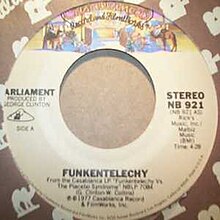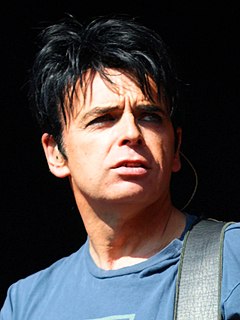
Gary Anthony James Webb, better known as Gary Numan, is an English musician, singer, songwriter, composer, and record producer. He entered the music industry as the frontman of the new wave band Tubeway Army. After releasing two albums with the band, he released his debut solo album The Pleasure Principle in 1979, topping the UK Albums Chart. While his commercial popularity peaked in the late 1970s and early 1980s with hits including "Are 'Friends' Electric?" and "Cars", Numan maintains a cult following. He has sold over 10 million records.
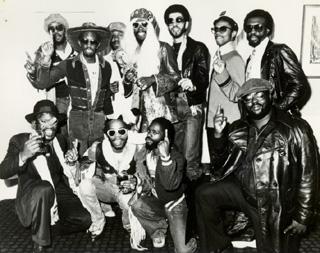
Parliament is an American funk band formed in the late 1960s by George Clinton as part of his Parliament-Funkadelic collective. More commercial and less rock-oriented than its sister act Funkadelic, Parliament drew on science-fiction and outlandish performances in their work. The band scored a number of Top 10 hits, including the million-selling 1976 single "Give Up the Funk ," and Top 40 albums such as Mothership Connection (1975).
The P-Funk mythology is a group of recurring characters, themes, and ideas primarily contained in the output of George Clinton's bands Parliament and Funkadelic. This "funkology" was outlined in album liner notes and song lyrics, in addition to album artwork, costumes, advertisements, and stage banter. P-Funk's "Dr. Seussian afrofunk" is often cited as a critical component of the Afrofuturism movement.

Highway to Hell is the sixth studio album by Australian hard rock band AC/DC, released on 27 July 1979. It was the last album featuring lead singer Bon Scott, who would die early the following year on 19 February 1980.

Blonde on Blonde is the seventh studio album by American singer-songwriter Bob Dylan, released as a double album on June 20, 1966 by Columbia Records. Recording sessions began in New York in October 1965 with numerous backing musicians, including members of Dylan's live backing band, the Hawks. Though sessions continued until January 1966, they yielded only one track that made it onto the final album—"One of Us Must Know ". At producer Bob Johnston's suggestion, Dylan, keyboardist Al Kooper, and guitarist Robbie Robertson moved to the CBS studios in Nashville, Tennessee. These sessions, augmented by some of Nashville's top session musicians, were more fruitful, and in February and March all the remaining songs for the album were recorded.
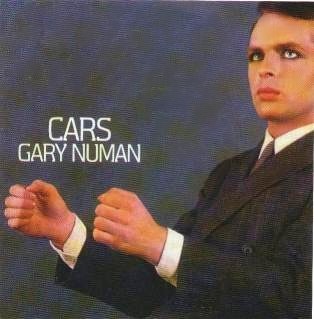
"Cars" is the debut solo single by English musician Gary Numan. It was released on 21 August 1979 and is from his debut studio album, The Pleasure Principle. The song reached the top of the charts in several countries, and today is considered a new wave staple.

Funkentelechy vs. the Placebo Syndrome is a funk album by Parliament, released in 1977.
"M.T.A.", often called "The MTA Song", is a 1949 song by Jacqueline Steiner and Bess Lomax Hawes. Known informally as "Charlie on the MTA", the song's lyrics tell an absurd tale of a man named Charlie trapped on Boston's subway system, which was then known as the Metropolitan Transit Authority (MTA). The song was originally recorded as a mayoral campaign song for Progressive Party candidate Walter A. O'Brien. A version of the song with the candidate's name changed became a 1959 hit when recorded and released by The Kingston Trio, an American folk singing group.

"Flash Light" is a song by funk band Parliament, written by George Clinton, Bernie Worrell, and Bootsy Collins and released in January 1978 on the album Funkentelechy Vs. the Placebo Syndrome. It was the first #1 R&B hit by any of the P-Funk groups and spent four months on the U.S. pop chart, peaking at #16.
"In the Flesh?" and "In the Flesh" are two songs by the English rock band Pink Floyd, released on their 1979 album, The Wall. "In the Flesh?" is the opening track, and introduces the story concept of the album. "In the Flesh" is the twenty-first song of the album, and is a reprise of the first with a choir, different verses and more extended instrumentation.
"Sad Eyed Lady of the Lowlands" is a song by Bob Dylan. First released as the closing track on Dylan's 1966 album Blonde on Blonde, the song lasts 11 minutes and 22 seconds, occupying the entire side four of the double album. Dylan has revealed that the song was written about his wife, Sara Lownds.
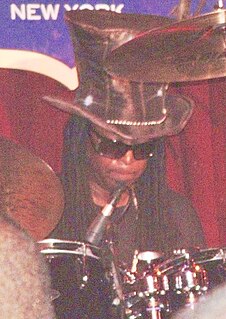
Jerome Eugene "Bigfoot" Brailey is an American drummer, best known for his work with P-Funk, which included the bands Parliament, Funkadelic, and numerous related projects. Brailey is a member of the Rock and Roll Hall of Fame, inducted in 1997 with fifteen other members of Parliament-Funkadelic.
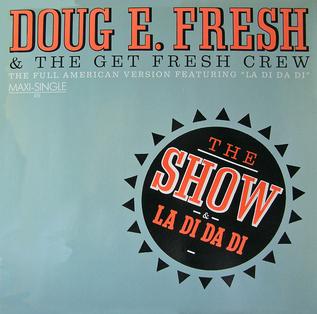
"La Di Da Di" is a song performed by Doug E. Fresh, who provides the beatboxed instrumental, and MC Ricky D, who performs the vocals. It was originally released in 1985 as the B-side to "The Show". The song has since gained a reputation as an early hip hop classic, and it is one of the most sampled songs in history.
"My cup runneth over" is a quotation from the Hebrew Bible and means "I have more than enough for my needs", though interpretations and usage vary.
"Sticks and Stones" is an English-language children's rhyme. The rhyme is used as a defense against name-calling and verbal bullying, intended to increase resiliency, avoid physical retaliation and to remain calm and good-living. The full rhyme is usually a variant of:

"I've Seen All Good People" is a song performed by the English progressive rock band Yes. Written by Yes members Jon Anderson and Chris Squire, it was first included on 1971's The Yes Album and has appeared on several later albums. As with many progressive rock songs, the track consists of multiple distinct movements spliced together to form a cohesive longer work. The first movement, titled "Your Move", was released as a single. It became a top 40 hit in the United States, which helped the group build momentum. Later, album-oriented rock stations would frequently play the entire nearly seven-minute track, including both "Your Move" and the second movement titled "All Good People"; this version has remained a staple of classic rock stations to today.
"Turn on, tune in, drop out" is a counterculture-era phrase popularized by Timothy Leary in 1966. In 1967, Leary spoke at the Human Be-In, a gathering of 30,000 hippies in Golden Gate Park in San Francisco and phrased the famous words, "Turn on, tune in, drop out". It was also the title of his spoken word album recorded in 1966. On this lengthy album, Leary can be heard speaking in a monotone soft voice on his views about the world and humanity, describing nature, Indian symbols, "the meaning of inner life", the LSD experience, peace, and many other issues.
"Get Off Your Ass and Jam" is a song by Funkadelic, track number 6 to their 1975 album Let's Take It to the Stage. It was written by George Clinton, although the lyrics are made up entirely of repetitions of the phrase, "Shit! Goddamn! Get off your ass and jam!", interspersed with lengthy guitar solos. Critic Ned Raggett reviewed the song as one that "kicks in with one bad-ass drum roll and then scorches the damn place down".

No gods, no masters is an anarchist and labour slogan. It has been in common use by anarchists and socialists in Europe since the late 19th century. The journal Commonweal, for instance, includes an article by John Creaghe from Sheffield in which he records that the Sheffield Telegraph newspaper "was furious when it found we were Anarchists with 'Neither God nor Master' for our motto". An early 20th century usage as a labour slogan is evident in a pamphlet handed out by the Industrial Workers of the World during the 1912 Lawrence Textile Strike. The phrase is derived from the French slogan "Ni dieu ni maître !" coined by the socialist Louis Auguste Blanqui in 1880, when he published a journal by that name. In Joseph Conrad's novel The Secret Agent, first published in 1907, the anarchist character The Professor says: "My device is: No God! No master."
